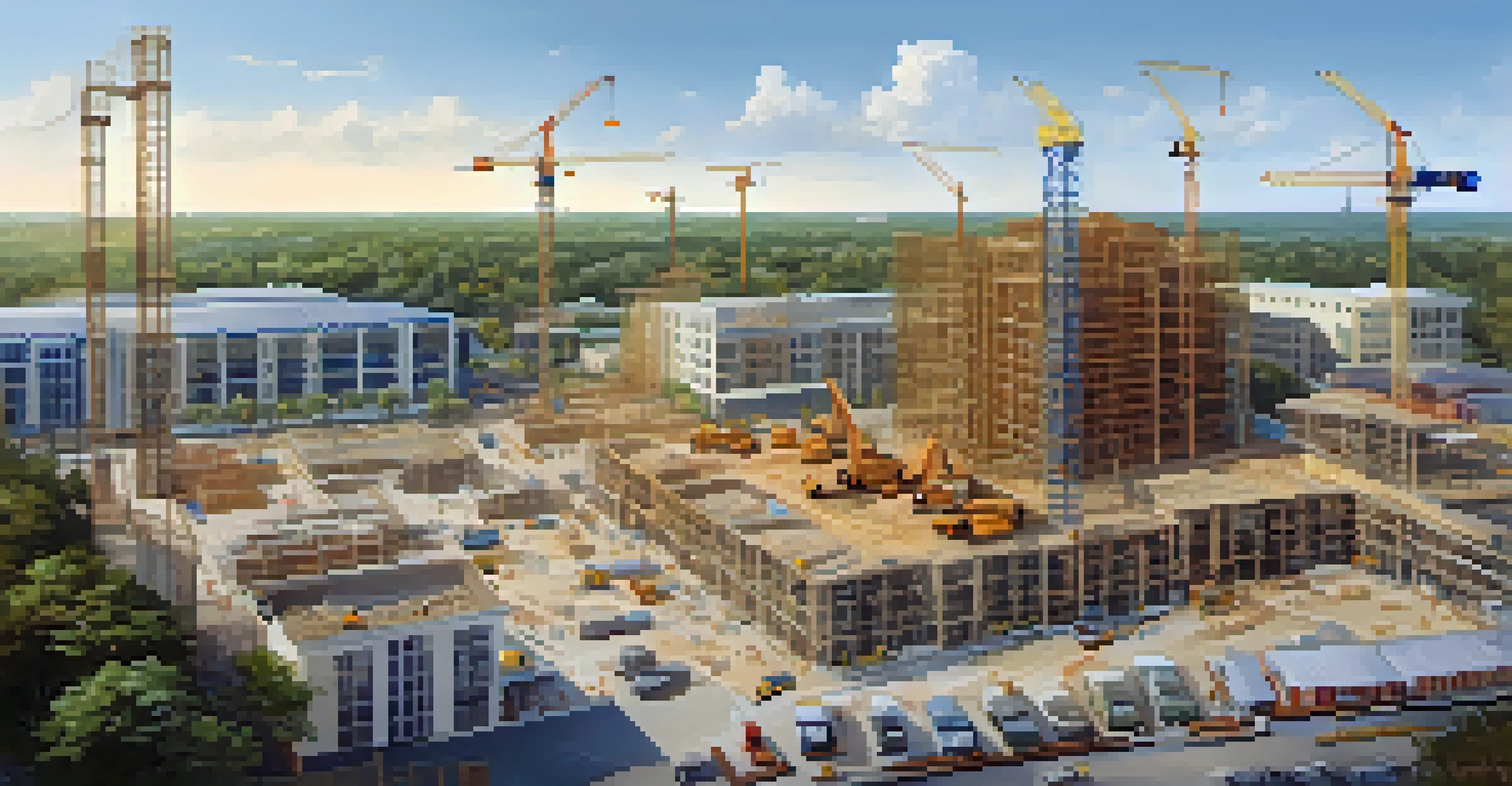Challenges Facing Orlando's Real Estate Development Projects

Understanding the Impact of Economic Fluctuations
Orlando's real estate market is often at the mercy of economic shifts. When the economy is thriving, development projects soar, but during downturns, uncertainty can halt progress. For instance, the COVID-19 pandemic demonstrated how quickly demand could drop, leaving many projects on hold.
Real estate is an impermanent investment that relies on a number of factors, including location, economic trends, and market conditions.
Investors and developers must navigate these economic currents carefully. Fluctuating interest rates and changing consumer behavior can significantly impact project viability. The key is to remain adaptable and informed about market trends.
Ultimately, understanding the local economy's pulse is essential for any successful real estate venture in Orlando. Developers who pay attention to these fluctuations can better position their projects to withstand economic storms.
Navigating Regulatory and Zoning Challenges
Regulatory hurdles and zoning laws can be daunting for real estate developers in Orlando. Each project must align with strict local regulations, which can vary significantly from one area to another. This complexity can lead to delays and increased costs.

For example, a developer may envision a new residential community, only to discover that zoning laws restrict the type of housing allowed. Understanding these regulations early in the planning process is crucial to avoid costly missteps.
Economic Factors Shape Real Estate
Orlando's real estate market is heavily influenced by economic fluctuations, requiring developers to stay informed and adaptable.
Collaborating with local authorities and community stakeholders can ease this transition. Building these relationships can help developers navigate the regulatory landscape more effectively, ensuring smoother project execution.
Addressing Infrastructure Limitations
Infrastructure is the backbone of any successful real estate project, and Orlando faces challenges in this regard. As the city grows, existing roads, utilities, and public services can struggle to keep up with demand. This can hinder new developments and impact their long-term sustainability.
Sustainability is no longer just a trend; it’s a necessity that developers must embrace to meet the expectations of today’s eco-conscious consumers.
For instance, a new residential project might be approved, but if the surrounding area lacks adequate transportation options, prospective buyers may be hesitant. Thus, developers need to consider not just their project, but the broader infrastructure landscape.
Investing in infrastructure improvements or partnering with local governments can enhance a project's appeal. By addressing these limitations proactively, developers can create more attractive and viable communities.
Confronting Environmental Concerns
Environmental sustainability is becoming a crucial consideration in Orlando's real estate development. Developers must account for the ecological impact of their projects, especially in a region known for its natural beauty and biodiversity. This includes assessing land use, water management, and wildlife preservation.
Recent regulations have pushed for greener building practices and more conscientious land development. For example, projects may need to incorporate green spaces or use sustainable materials to meet environmental standards.
Community Engagement Drives Success
Involving local residents in the planning process fosters goodwill and leads to projects that better meet community needs.
Navigating these requirements can be challenging, but they also present opportunities. Developers who prioritize sustainability can attract eco-conscious buyers and enhance their project's reputation.
Competition and Market Saturation Risks
With Orlando's booming real estate market, competition is fierce. Many developers are eager to capitalize on the demand for housing and commercial spaces, leading to market saturation in certain areas. This increased competition can drive up costs and reduce profit margins.
Consider the surge of apartment complexes in downtown Orlando; while they meet demand, they also create a crowded market where standing out becomes challenging. Developers must differentiate their projects through unique features or amenities to attract buyers or tenants.
Understanding market dynamics and conducting thorough research can help developers identify niche opportunities. By focusing on underserved segments of the market, they can carve out a successful path amidst the competition.
The Role of Community Engagement
Community engagement plays a pivotal role in the success of real estate projects in Orlando. Developers are increasingly recognizing the importance of involving local residents in the planning process. This approach not only fosters goodwill but can also lead to valuable insights about community needs.
For instance, hosting town hall meetings or surveys allows developers to gauge public sentiment and adjust their projects accordingly. When residents feel heard and valued, they are more likely to support new developments.
Technology Enhances Development Efficiency
Leveraging technology, such as data analytics and virtual reality, can streamline processes and give developers a competitive advantage.
Engaging with the community can also mitigate opposition and streamline approvals. By prioritizing community feedback, developers can create projects that truly resonate with the people who will inhabit them.
Managing Supply Chain and Labor Challenges
In today's world, supply chain disruptions and labor shortages have become a common hurdle for real estate developers. Orlando is no exception, as the demand for construction materials and skilled labor can often outstrip supply. This can lead to project delays and increased costs.
For example, a developer might face a shortage of lumber or concrete, pushing back timelines and frustrating stakeholders. Building relationships with multiple suppliers and having contingency plans in place can help mitigate these issues.

Moreover, attracting and retaining skilled labor is vital for successful project execution. By fostering a positive work environment and offering competitive wages, developers can build a reliable workforce that can navigate these challenges effectively.
Leveraging Technology in Real Estate Development
Technology is transforming the landscape of real estate development in Orlando. From virtual reality tours to advanced project management software, developers can streamline processes and enhance their offerings. Embracing these digital tools can give projects a competitive edge.
For example, using drone technology for site inspections can save time and provide valuable insights that ground-level assessments might miss. Additionally, data analytics can help developers identify trends and make informed decisions based on market demands.
By leveraging technology, developers can improve efficiency, reduce costs, and ultimately create better projects. Staying ahead of technological advancements is essential for those looking to thrive in Orlando's dynamic real estate market.